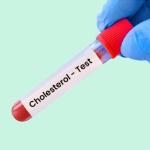
Cholesterol Levels
Tested By Sri Divya Diagnostic Center
What is a Cholesterol Test? A cholesterol test is a blood test that measures the amount of cholesterol and certain fats in your blood. Cholesterol is a waxy, fat-like substance that's found in your blood and every cell of your body. You need some cholesterol to keep your cells and organs healthy. Your liver makes all the cholesterol your body needs. But you can also get cholesterol from the foods you eat, especially meat, eggs, poultry, and dairy products. Foods that are high in dietary fat ca
Lab Test Details
Description
What is it used for?
A cholesterol test gives you and your health care provider important information about your risk of developing heart disease. If your test shows you have high cholesterol, you can take steps to lower it. This may decrease your risk of developing heart problems in the future. A cholesterol test measures:
• LDL levels. Also known as the "bad" cholesterol, LDL is the main source of blockages in the arteries.
• HDL levels. Considered the "good" cholesterol, HDL helps get rid of "bad" LDL cholesterol.
• Total cholesterol. The combined amount of LDL cholesterol and HDL cholesterol in your blood.
• Triglyceride levels. Triglycerides are a type of fat found in your blood. Some studies show that high levels of triglycerides may increase the risk of heart disease, especially in women.
• VLDL levels. Very low-density lipoprotein (VLDL) is another type of "bad" cholesterol. High VLDL levels have been linked to plaque buildup in the arteries. VLDL isn't usually included in routine cholesterol tests because it's difficult to measure. About half of VLDL is triglycerides, so your VLDL level can be estimated as a percentage of your triglyceride level.
Why do I need a cholesterol test?
Your provider may order a cholesterol test as part of a routine exam. You may also have a cholesterol test if you have a family history of heart disease or if your risk for heart problems is high because of:
• High blood pressure
• Type 2 diabetes
• Smoking
• Excess weight or obesity
• Lack of physical activity
• A diet high in saturated fat
Your age may also be a factor, because your risk for heart disease increases as you get older.
What happens during a cholesterol test?
A health care professional will take a blood sample from a vein in your arm, using a small needle. After the needle is inserted, a small amount of blood will be collected into a test tube or vial. You may feel a little sting when the needle goes in or out. This usually takes less than five minutes.
You may be able to use an at-home kit to check your cholesterol levels. Your kit will include a device to prick your finger to collect a drop of blood for testing. Be sure to follow the kit instructions carefully. Also, be sure to tell your provider if your at-home test shows that your total cholesterol level is higher than 200 mg/dl.
Will I need to do anything to prepare for the test?
You may need to fast (not eat or drink) for 9 to 12 hours before your blood cholesterol test. That's why the tests are often done in the morning. Your provider will let you know if you need to fast and if there are any other special instructions.
What do the results mean?
Cholesterol is usually measured in milligrams (mg) of cholesterol per deciliter (dL) of blood. The information below will help you understand what your test results mean. In general, low LDL levels and high HDL cholesterol levels are good for heart health.
Total Cholesterol Level Category
Less than 200mg/dL Desirable
200-239 mg/dL Borderline high
240mg/dL and above High
LDL (Bad) Cholesterol Level LDL Cholesterol Category
Less than 100mg/dL Optimal (best for your health)
100-129mg/dL Near optimal
130-159 mg/dL Borderline high
160-189 mg/dL High
190 mg/dL and above Very High
HDL (Good) Cholesterol Level HDL Cholesterol Category
60 mg/dL and higher Considered protective against heart disease
40-59 mg/dL The higher, the better
Less than 40 mg/dL A major risk factor for heart disease
The LDL listed on your results may say "calculated." This means that your LDL level is an estimate based on your total cholesterol, HDL, and triglycerides. Your LDL level may also be measured "directly" from your blood sample. Either way, you want your LDL number to be low.
A healthy cholesterol level for you may depend on your age, family history, lifestyle, and other risk factors for heart disease, such as high triglyceride levels. our provider can explain what's right for you.
₹ 180.00 ₹ 162.00
-
Free Shipping
For orders from ₹500 -
-
-
